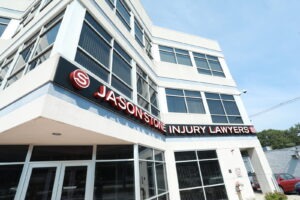
If you’ve been involved in a car accident in Boston, don’t hesitate to seek the counsel of a reputable Boston car accident lawyer to help you navigate the legal process and secure the compensation you deserve.
When facing the aftermath of an injury, having a dedicated Boston personal injury lawyer by your side can make all the difference in ensuring your rights are protected and justice is served.
The first step toward compensation for your losses in the aftermath of a car accident is determining who is at fault for the crash. Unfortunately, when the accident occurs at a busy 4-way stop, the definitive liability lines can blur, leaving you wondering whose insurance company should pay. This is when a personal injury lawyer can step in and help identify at-fault parties and gather evidence to support your claim. If you have questions about your case, it is never too soon to contact a lawyer.
Determining Fault in a 4-Way Stop Sign Collision
Realistically, far too many drivers either do not understand how to use a 4-way stop or refuse to follow the right-of-way rules. Therefore, to understand who is liable, you need to know how a 4-way stop works. Once you can identify the person who violated traffic laws, you can build your negligence claim against them.
Right-of-Way Rules
The rules at a 4-way stop are relatively simple, and once you know them, the system makes sense. First, consider the basics of right-of-way:
- Proceed in the order you arrived. This is self-explanatory. If you were the first to arrive at the 4-way stop, you are the first to go, and the order is the same in succession. The second to arrive goes next, and so on.
- When two people arrive at the same time, the one on the right goes first. A common question about right-of-way regards what you should do if two cars next two one another arrive at the same time. The law says that the person on the right has the right-of-way. Therefore, if the vehicle is to your left, you go first. If it is to your right, they go first.
- When two people across from each other arrive at the same time, the one going straight has the right-of-way. Look for a turn signal if you both arrive at the stop simultaneously. If either of you has a turn signal, the person going straight goes first.
- When two cars arrive at the same time and turn in the same direction, the one on the right goes first. This applies to drivers across from one another at the intersection. If you both go in the same direction, one turns right, and the other turns left. The driver turning right goes first.
Note that the foundation of these rules is that each driver must pay attention to the order in which everyone arrives. It only takes one distracted driver at a busy 4-way stop to cause an accident. Additionally, someone who does not know these rules will have difficulty determining when it is their turn to go. As a result, collisions at intersections can be confusing and often lead to battles over fault.
Taking Steps To Protect Your Right to Compensation
To protect your right to compensation and ensure you have sufficient evidence to show that the other driver is at-fault for your accident, you can start documenting everything from the start. Some steps to follow include:
- Getting a police report. Always report the accident to the police. Officers may not arrive at the scene to investigate if it is a minor collision resulting in no bodily harm. However, you can still file your own report through the station website or visit in person to file. A police report can be a vital source of support for your claim.
- Record everything. Use your phone to take photographs, videos, and notes about the accident immediately. Document the positions of each vehicle involved in the crash and include any critical signage. Experts can tell who violated right-of-way rules simply by looking at the positions of each vehicle. Record your injuries, damage to each car, and your explanation of what happened.
- Get everyone’s information. Ask the other driver or drivers to provide their license and insurance information. If there are any eyewitnesses, such as passengers, other drivers, or pedestrians, ask for their contact information.
- Avoid talking to anyone except the police. You can provide your statement to the police when they arrive. However, avoid talking to the other drivers or passengers about the accident. Even a simple apology could be used to shift blame.
- Seek a complete medical evaluation. You may feel fine, but a car accident can shock your system. The adrenaline alone can mask pain. Have a doctor complete an assessment as soon as possible so you have a record of your injuries directly connected to the accident.
- Contact a car accident attorney. You can call a lawyer as soon as moments after the accident. They will help you protect your right to compensation and advise you about the steps you should take next.
Not everyone has the opportunity to document the scene in the immediate wake of a car crash. In cases involving severe injuries, sometimes the most you can do is wait for emergency medical services. If this was the case for you, your attorney could still help you build a solid case with supporting evidence.
Identifying Potential Damages
The potential damages from a car accident case at a 4-way stop can be extensive depending on several factors, including the speed and position of the vehicles at the time of the crash. However, most cases involve some variation of the following compensatory damages:
- Medical bills, including ambulance and emergency care expenses, medications, hospital stays, doctor visits, specialists, rehabilitation, surgeries, and ongoing treatment
- Lost wages from missed work or diminished earning capacity
- Repair of damaged property
- Physical pain and suffering
- Emotional distress
- Mental anguish
- Loss of the enjoyment of life
- Loss of consortium
The monetary losses are economic damages, and the psychological losses are non-economic. Your accident attorney will help you gather the evidence needed to prove your claim for each type of damage.
Non-Compensatory Damages
Punitive damages are types of non-compensatory payment the court may order the defendant to pay if their actions constituted gross negligence or malintent. For example, if the driver that hit you was impaired and flew through the 4-way stop while speeding, the court may punish them beyond just their liability for damages with the help of a speeding accident attorney.
Knowing When To Hire a Car Accident Lawyer
No one takes to the road anticipating a car accident. However, the consequences can be physically, emotionally, and financially devastating when it happens. In addition, victims sometimes face combative insurance adjusters only interested in protecting the company’s profits. As a result, you can quickly become frustrated and give up without the help of a Boston car accident lawyer. They handle every aspect of your case, from filing all the necessary paperwork and gathering the evidence to support your claim to negotiating with the insurer for a fair settlement and preparing your case for trial if necessary.
At Jason Stone Injury Lawyers, we treat our clients like family, looking out for your best interests and ensuring no one involved in the case takes advantage of you. We approach every case with an understanding of the unique circumstances and use our combined expertise to build a solid claim. We know how important it is to access compensation quickly so you can start rebuilding your life. To help alleviate some of the financial burdens, we charge no upfront fees for our services. The very first element of our Stone Cold Guarantee states that our payment comes when yours does. Contact Jason Stone Injury Lawyers at (800) 577-5188 to schedule your risk-free consultation today. There’s No Obligation, Just Information (R).
Not Trusting What You’re Being Told?
Better Phone Stone
(800) 577-5188
 START MY NO OBLIGATION CONSULTATION
START MY NO OBLIGATION CONSULTATION











